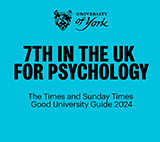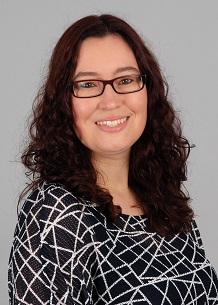
Dr Angela de Bruin
Senior Lecturer
Profile
Biography
- PhD Psychology, University of Edinburgh, UK (2013-2016, awarded 2017)
- MSc Cognitive Neuroscience, Radboud University Nijmegen, the Netherlands (2011-2013)
- BA Linguistics, Radboud University Nijmegen, the Netherlands (2008-2011)
Angela completed her BA in Linguistics and MSc in Cognitive Neuroscience at the Radboud University in Nijmegen, the Netherlands. In 2013 she moved to Edinburgh, where she completed her PhD in Psychology. Between 2016 and 2019, she was working as a postdoctoral researcher and Marie Curie Fellow at the Basque Center on Cognition, Brain and Language (San Sebastián, Spain). Her research interests include bilingualism, language switching, language production, executive control, and cognitive ageing.
Career
- Senior Lecturer, Department of Psychology, University of York, UK (2023 – present)
- Lecturer, Department of Psychology, University of York, UK (2019 – 2023)
- Postdoctoral researcher / Marie Curie Fellow, Basque Center on Cognition, Brain and Language, Spain (2016-2019)
Research
Overview
My research interests include bilingualism, language switching, language production, executive control, and cognitive ageing.
Projects
I am interested in how both monolinguals and bilinguals understand and produce language across the lifespan. Some of the specific questions I work on are:
- How do bilinguals use and control their languages in different interactional contexts, for example in contexts that require the use of a specific language versus contexts in which multiple languages can be used?
- How does language control relate to individual differences (e.g., language use) between and within bilinguals and how can we improve our measures of these individual differences?
- How do both bilinguals and monolinguals choose which words to use and how do bilinguals choose which language to use?
- How do language production and comprehension change across the lifespan, especially with ageing? How does bilingual language control, as well as daily-life language use and switching, change with ageing?
I would be very happy to supervise projects related to these questions and/or my general research interests. Please get in touch if you would like to discuss potential projects or PhD applications.
Grants
- 2024 – 2029 UKRI Frontiers Research Guarantee Grant (ERC Selected Starting Grant, £1,237,798)
- 2021 – 2023 ESRC New Investigator grant (£298,060)
- 2021 – 2022 Language Learning Early Career research grant (£6,042)
- 2020 – 2021 Experimental Psychology Society Small Grant (£3,500)
- 2017 – 2019 Marie Curie Postdoctoral Fellowship (€158,121)
Supervision
- Naveen Hanif (PhD student)
- Emily Rice (PhD student)
- Elina Morina (PhD student)
Publications
Selected publications
- de Bruin, A., & Shiron, V. (in press). Putting language switching in context: Effects of sentence context and interlocutors on bilingual switching. Journal of Experimental Psychology: Learning, Memory, and Cognition.
- de Bruin, A., Hoversten, L. J., & Martin, C. D. (2023). Interference between non-native languages during trilingual language production. Journal of Memory and Language, 128, 104386.
- de Bruin, A., & Martin, C. D. (2022). Perro or txakur? Bilingual language choice during production is influenced by personal preferences and external primes. Cognition, 222, 104995.
- de Bruin, A., Samuel, A. G., & Duñabeitia, J. A. (2020). Examining bilingual language switching across the lifespan in cued and voluntary switching contexts. Journal of Experimental Psychology: Human Perception and Performance, 46(8), 759-788
- Jevtović, M., Duñabeitia, J. A., & de Bruin, A. (2020). How do bilinguals switch between languages in different interactional contexts? A comparison between voluntary and mandatory language switching. Bilingualism: Language and Cognition, 23(2), 401-413.
- de Bruin, A., Samuel, A. G., & Duñabeitia, J. A. (2018) Voluntary language switching: When and why do bilinguals switch between their languages? Journal of Memory and Language, 103, 28-43.
- Lehtonen, M., Soveri, A., Laine, A., Järvenpää, J., de Bruin, A., & Antfolk, J. (2018). Is bilingualism associated with enhanced executive functioning in adults? A meta-analytic review. Psychological Bulletin, 144(4), 394-425.
- de Bruin, A., Bak, T. H., & Della Sala, S. (2015). Examining the effects of active versus inactive bilingualism on executive control in a carefully matched non-immigrant sample. Journal of Memory and Language, 85, 15-26.
- de Bruin, A., Treccani, B., & Della Sala, S. (2015). Cognitive Advantage in Bilingualism: An Example of Publication Bias? Psychological Science, 26(1), 99-107.
- de Bruin, A., Roelofs, A., Dijkstra, T., & FitzPatrick, I. (2014). Domain-general inhibition areas of the brain are involved in language switching: fMRI evidence from trilingual speakers. NeuroImage, 90, 348-359.
Full publications list
See Google Scholar or the York Research Database for a full list of publications.
Teaching
Undergraduate
- Project and literature survey supervision
- Advanced Module: Bilingualism and Cognition
External activities
Editorial duties
- Associate Editor Journal of Memory and Language
- Section editor The Encyclopedia of Applied Linguistics

Contact details
https://angeladebruin.wordpress.com/
@@angela_debruin
